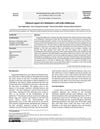 71 citations,
May 2007 in “The FASEB journal”
71 citations,
May 2007 in “The FASEB journal” Human hair follicles produce and respond to erythropoietin, helping protect against stress.
 20 citations,
October 2017 in “Clinical Endocrinology”
20 citations,
October 2017 in “Clinical Endocrinology” The conclusion is that removing both ovaries is the best treatment for excess male hormones in postmenopausal women, with medication as another option, and managing insulin resistance is important for diagnosis and treatment.
 22 citations,
October 2017 in “Australian & New Zealand Journal of Obstetrics & Gynaecology”
22 citations,
October 2017 in “Australian & New Zealand Journal of Obstetrics & Gynaecology” Many young Australian women think they have PCOS, but only a few are diagnosed correctly, causing unnecessary worry.
 10 citations,
July 2002 in “Australasian Journal of Dermatology”
10 citations,
July 2002 in “Australasian Journal of Dermatology” Careful management of blood thinners is crucial for lupus patients with APS.
 July 2002 in “Australasian Journal of Dermatology”
July 2002 in “Australasian Journal of Dermatology” Maintaining anticoagulation is crucial for patients with antiphospholipid syndrome.
 48 citations,
July 2002 in “Journal of Cutaneous Medicine and Surgery”
48 citations,
July 2002 in “Journal of Cutaneous Medicine and Surgery” Skin problems are common and important signs of eating disorders and treating the eating disorder can improve these skin conditions.
 4 citations,
March 2002 in “Journal of the American Pharmaceutical Association”
4 citations,
March 2002 in “Journal of the American Pharmaceutical Association” The conclusion is that pharmacists are important in helping women choose the right skin care treatments.
5 citations,
July 2020 in “PubMed” Both oral contraceptives reduced hirsutism in PCOS patients, but adding metformin showed no extra benefit.
 1 citations,
July 2020 in “Bezmialem science”
1 citations,
July 2020 in “Bezmialem science” Reflexology massage helps hair regrowth in women after chemotherapy.
 December 2011 in “Korean journal of veterinary research”
December 2011 in “Korean journal of veterinary research” A Miniature Pinscher dog with hair loss and scaling was diagnosed with pattern alopecia and improved with melatonin treatment.
 157 citations,
July 2001 in “British Journal of Dermatology”
157 citations,
July 2001 in “British Journal of Dermatology” AGA more common in men, Koreans have lower rates and unique patterns.
 22 citations,
August 2011 in “Endocrine Practice”
22 citations,
August 2011 in “Endocrine Practice” Most hirsutism cases are due to PCOS, and treatment focuses on lowering testosterone and blocking its effects.
 32 citations,
November 2011 in “Reproductive Sciences”
32 citations,
November 2011 in “Reproductive Sciences” Brazilian women with PCOS and both menstrual irregularity and high male hormone levels have a higher chance of having metabolic syndrome.
 January 2012 in “Postgraduate obstetrics & gynecology”
January 2012 in “Postgraduate obstetrics & gynecology” Up to half of women by age 50 experience significant hair loss, with various types and treatments available.
 10 citations,
March 1992 in “European Archives of Psychiatry and Clinical Neuroscience”
10 citations,
March 1992 in “European Archives of Psychiatry and Clinical Neuroscience” Hair loss from mood stabilizers can grow back, but the reasons why are not fully understood.
 36 citations,
November 2009 in “Journal of Investigative Dermatology”
36 citations,
November 2009 in “Journal of Investigative Dermatology” Prolactin may affect hair growth differently based on gender and scalp area.
 10 citations,
March 2007 in “Skinmed”
10 citations,
March 2007 in “Skinmed” The conclusion is that in the Indian subcontinent, socioeconomic status, stress, and family structure affect the severity of alopecia areata, and its psychological impact is generally mild or moderate.
 28 citations,
January 2007 in “Journal of dermatology”
28 citations,
January 2007 in “Journal of dermatology” Three white adults had a rare scalp condition with increased fat and sometimes hair loss, suggesting it's not limited to black women and might be more widespread.
 15 citations,
April 2003 in “Journal of dermatology”
15 citations,
April 2003 in “Journal of dermatology” Alopecia areata causes hair loss due to an immune attack on hair follicles, influenced by genetics and environment.
3 citations,
March 2023 in “International journal of molecular sciences” Keratin protein production in cells is controlled by a complex system that changes with cell type, health, and conditions like injury or cancer.
 52 citations,
May 2003 in “The journal of investigative dermatology/Journal of investigative dermatology”
52 citations,
May 2003 in “The journal of investigative dermatology/Journal of investigative dermatology” Parathyroid hormone-related protein helps control hair growth phases in mice.
 39 citations,
March 2003 in “The Veterinary clinics of North America. Small animal practice/Veterinary clinics of North America. Small animal practice”
39 citations,
March 2003 in “The Veterinary clinics of North America. Small animal practice/Veterinary clinics of North America. Small animal practice” Behavioral dermatology treats skin problems by considering both emotional and physical factors.
3 citations,
October 2023 in “Cosmetics” Healthy lifestyle changes can significantly improve skin health as you age.
6 citations,
December 2021 in “International Journal of Endocrinology” The genetic variant studied does not affect PCOS symptoms in Kashmiri women.
10 citations,
September 2021 in “American Journal of Medical Genetics Part A” Woodhouse-Sakati syndrome shows varied symptoms, including hair loss and diabetes, and is common in Qatar due to a specific genetic variant.
 March 2021 in “Veterinary research forum”
March 2021 in “Veterinary research forum” A Holstein calf in Iran with a severe genetic skin disorder was euthanized due to incurable symptoms.
6 citations,
March 2020 in “Anais Brasileiros de Dermatologia” CTLA4 gene variants are not linked to alopecia areata in Monterrey's Mexican population.
 7 citations,
January 2003 in “Elsevier eBooks”
7 citations,
January 2003 in “Elsevier eBooks” Testosterone is crucial for development, growth, and various body functions in mammals.
 29 citations,
January 2007 in “American Journal of Clinical Dermatology”
29 citations,
January 2007 in “American Journal of Clinical Dermatology” Eyebrow loss has many causes and requires accurate diagnosis for proper treatment.
 284 citations,
November 1999 in “Neurology”
284 citations,
November 1999 in “Neurology” The article suggests managing interferon beta therapy side effects in MS with dose adjustments, medications, and patient education.
























